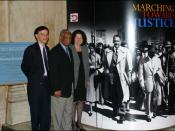There are several controversial issues surrounding racial profiling and the various problems that are encountered as a result of it. One issue is whether or not racial profiling exists. Most law enforcement departments refuse to undergo a study and they deny that racial profiling exists. These problems, coupled with the status of literature regarding this topic at this point, are more unreliable than scientific. In addition, the topic is controversial because the United States believes that it has rid itself of prejudice and racism, and to open the topic of racial profiling by law enforcement personnel is admitting that its possible the nation is backsliding. As a result, the events of September 11th stepped up the pace of racial profiling by law enforcement and grew to include new groups of people.
Racial profiling is a topic that is seen across the nation in the media. Racial profiling has often been referred to as the apparition occurrence because so far departments across the nation clearly deny its existence.
The topic is a growing one in light of the September 11, 2001 attacks on America. Racial profiling has been a top news story since that attack but it was an issue for many years before that.
The equal protection clause can be found in the Fourteenth Amendment of the Constitution. It simply states that, "No state shall make or enforce any law which shall abridge the privileges or immunities of citizens of the United States...nor deny to any person within its jurisdiction the equal protection of the laws." In other words, this meant that the Constitution would become 'color-blind'. State laws would no longer be allowed to treat whites and blacks differently. The Supreme Court relied heavily upon the "separate but equal" doctrine to determine when a state law violated the equal...


